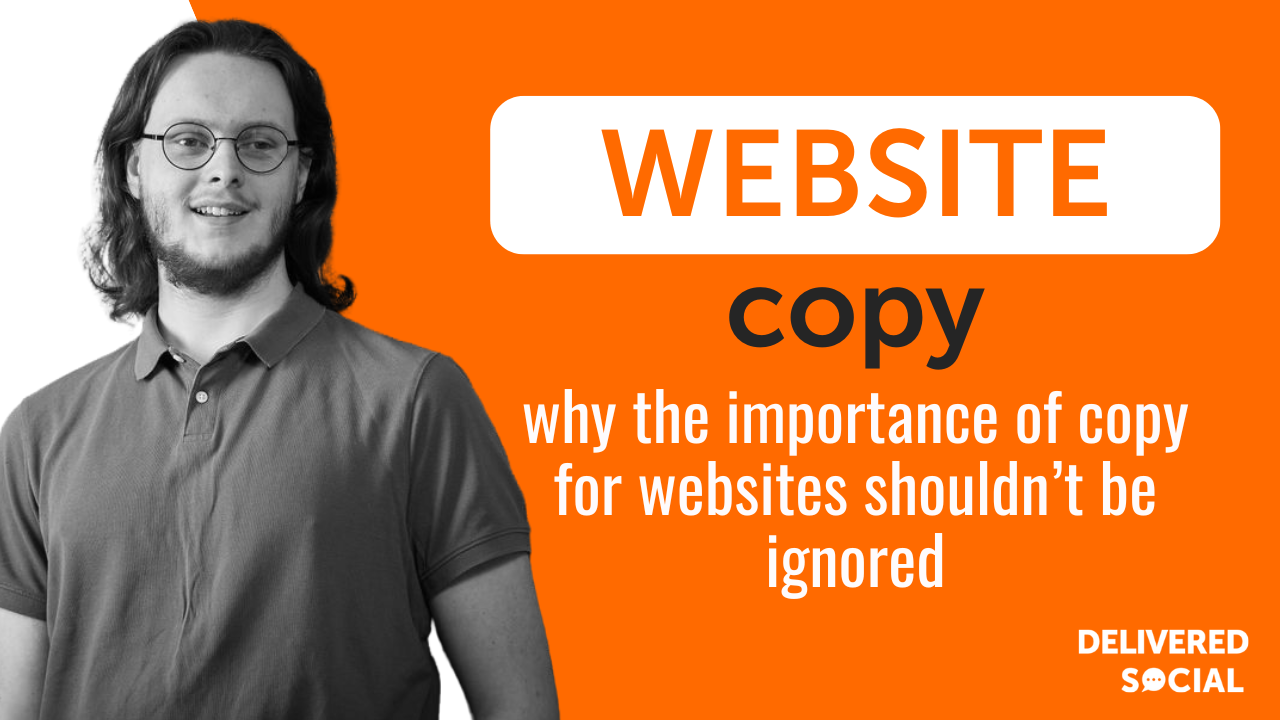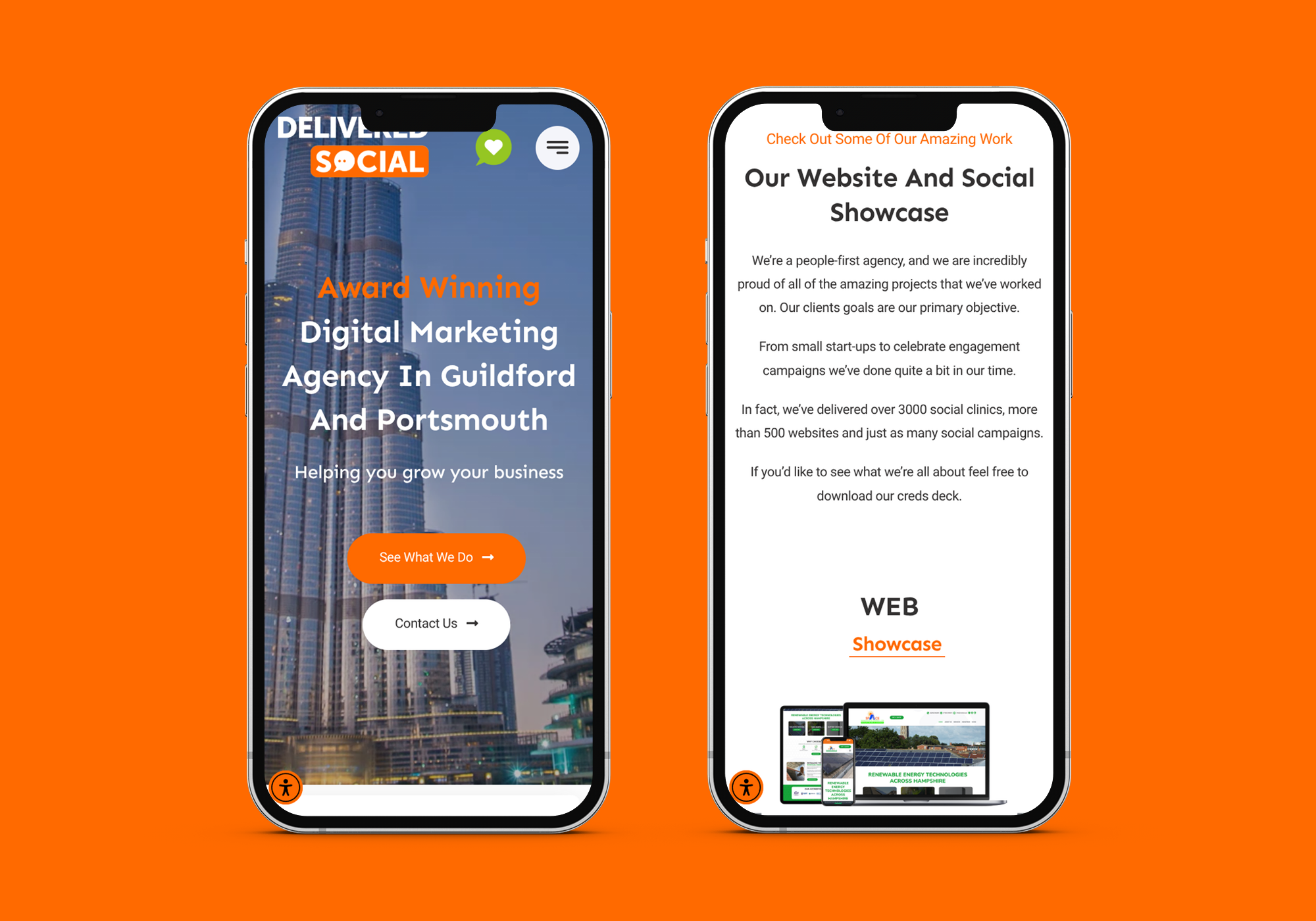
At Delivered Social we get asked constantly about the importance of copy for websites, and it’s something we see a lot of websites missing the mark on.
Your website might have a stunning design, fast loading speeds, and an easy-to-navigate layout but if the copy isn’t compelling, you’ll struggle to convert visitors into customers.
Think about it when someone lands on your website, they’re looking for information, solutions, and reasons to trust your brand. Every word on your site plays a role in guiding them toward taking action, whether that’s making a purchase, signing up for a newsletter, or booking a consultation. Bad website copy confuses, frustrates, or bores visitors, while great copy keeps them engaged and moves them towards conversion.
But website copywriting isn’t just about selling it also affects your search rankings, brand authority, and user experience. Well-written copy makes it easier for people to find you on Google, understand what you do within seconds, and feel confident enough to engage with your business.
In this blog, we’ll explore:
- What website copy is and why it matters.
- How copy impacts SEO and your site’s rankings.
- What makes website copy persuasive and conversion-friendly?
- Common copywriting mistakes that could be hurting your business.
- Best practices for writing engaging and effective website copy.
If you want a website that attracts visitors, ranks well on Google, and converts leads into customers, then the words on your site matter more than you think. Let’s dive into why copywriting is the foundation of a successful website.
What is the Importance of Copy for Websites?
Website copy is more than just words on a screen it’s the voice of your brand, guiding visitors through their journey on your site. Good website copy explains who you are, what you offer, and why visitors should trust you, all while keeping them engaged.
Unlike blog content, which is designed to educate or entertain, website copy is strategically crafted to drive action. It includes headlines, product descriptions, service pages, and even microcopy like button text and error messages. Every word has a purpose, whether it’s to inform, persuade, or convert.
Why is Website Copy So Important?
- First Impressions Matter – When users land on your site, the first thing they read will determine whether they stay or leave. Clear, concise, and engaging copy makes visitors want to explore further.
- SEO Benefits – Well-written copy helps your website rank on search engines by incorporating relevant keywords while maintaining readability and natural flow.
- Converts Visitors into Customers – Great copy moves people through the sales funnel by answering questions, addressing pain points, and making it easy to take the next step.
- Builds Trust and Credibility – A website with professionally written copy makes your brand appear more authoritative and reliable.
Poorly written or overly complicated copy can confuse potential customers, making them click away in frustration. On the other hand, compelling and persuasive copy keeps people on your site longer and encourages them to take action, whether that’s making a purchase, booking a service, or filling out a contact form.

How Copywriting Impacts SEO & Search Rankings
Good website copy isn’t just about engaging visitors it plays a crucial role in how well your site ranks on search engines. Search engines like Google prioritise high-quality, relevant, and well-structured content when determining rankings. That means your copy needs to do more than just sound good; it needs to be optimised for SEO.
Keywords & Natural Integration
One of the biggest SEO factors is keyword usage. Including relevant search terms like “What is the importance of copy for websites?” naturally throughout your content helps search engines understand what your site is about. However, keyword stuffing cramming in as many search terms as possible can hurt your rankings. Instead, focus on seamlessly integrating keywords in a way that feels natural to the reader.
Readability & User Experience
Search engines favour websites that offer a great user experience. That includes content that is clear, concise, and well-structured. Breaking up text with headings, bullet points, and short paragraphs makes it easier to read and helps search engines index your content properly.
Meta Descriptions & Headings
Well-crafted meta descriptions and headings give search engines more context about your page. Using compelling, keyword-rich headings (H1, H2, H3) and a strong meta description encourages higher click-through rates (CTR) from search results.
Internal Linking & Content Depth
Google prioritises sites that provide valuable, interconnected content. Using internal links to other relevant pages on your website (like blogs or service pages) helps keep visitors engaged longer and signals to search engines that your site is an authority on its topic.
SEO-friendly copy doesn’t just help you rank it ensures that the right audience finds your content and engages with your brand.
How Copywriting Impacts SEO & Search Rankings
Good website copy isn’t just about engaging visitors it plays a crucial role in how well your site ranks on search engines. Search engines like Google prioritise high-quality, relevant, and well-structured content when determining rankings. That means your copy needs to do more than just sound good; it needs to be optimised for SEO.
Keywords & Natural Integration
One of the biggest SEO factors is keyword usage. Including relevant search terms like “What is the importance of copy for websites?” naturally throughout your content helps search engines understand what your site is about. However, keyword stuffing cramming in as many search terms as possible can hurt your rankings. Instead, focus on seamlessly integrating keywords in a way that feels natural to the reader.
Readability & User Experience
Search engines favour websites that offer a great user experience. That includes content that is clear, concise, and well-structured. Breaking up text with headings, bullet points, and short paragraphs makes it easier to read and helps search engines index your content properly.
Meta Descriptions & Headings
Well-crafted meta descriptions and headings give search engines more context about your page. Using compelling, keyword-rich headings (H1, H2, H3) and a strong meta description encourages higher click-through rates (CTR) from search results.
Internal Linking & Content Depth
Google prioritises sites that provide valuable, interconnected content. Using internal links to other relevant pages on your website (like blogs or service pages) helps keep visitors engaged longer and signals to search engines that your site is an authority on its topic.
SEO-friendly copy doesn’t just help you rank it ensures that the right audience finds your content and engages with your brand. Now, let’s explore how to write website copy that actually converts visitors into paying customers.

Common Copywriting Mistakes That Kill Your Website’s Success
Even the best-designed websites can fail if their copy isn’t effective. Poorly written content can confuse visitors, fail to connect with their needs or create friction in the buying process. Here are some of the most common mistakes businesses make with website copy and how to fix them.
Too Much Information Overload
Your website copy should be clear and to the point. Long, unstructured paragraphs can overwhelm visitors, causing them to leave before taking action. Instead, break up text using bullet points, subheadings, and short paragraphs to enhance readability. Your website should be clear and to the point. Long, unstructured paragraphs and excessive details can overwhelm visitors and make them leave. Keep copy concise and scannable, using bullet points and subheadings for easy reading.
Not Addressing Customer Needs
Many businesses focus too much on what they do rather than how they solve customer problems. Effective copy should directly address customer pain points and explain why your product or service is the solution. Many businesses focus too much on what they do instead of how they help. Your copy should address customer pain points and offer clear solutions.
✘ Instead of: “We provide top-tier marketing services.”
✔ Say: “Struggling to generate leads? We help businesses grow with data-driven marketing.”
Weak or Confusing Call-to-Actions (CTAs)
A website without clear CTAs won’t convert visitors. Every page should guide users toward an action, whether it’s purchasing a product, booking a consultation, or signing up for a newsletter. Strong CTAs should be action-driven and placed strategically throughout the site. A website without strong CTAs won’t convert. Every page should guide visitors to take action, whether that’s making a purchase, booking a consultation, or subscribing to a newsletter.
✘ Avoid: “Click Here” or “Learn More”
✔ Use: “Download Your Free Guide” or “Get a Personalised Quote”
Poor SEO Implementation
Copy that isn’t optimised for search engines will struggle to rank. Ensure you use targeted keywords naturally, include internal links, and structure your content for readability. Avoid keyword stuffing, and focus on creating value-driven, engaging content that appeals to both users and search engines. Copy that isn’t optimised for search engines won’t rank well. Use targeted keywords, internal links, and readable formatting to boost visibility and attract high-quality traffic.
Avoiding these common mistakes will enhance your website’s performance, improving engagement, conversions, and search rankings. Next, we’ll discuss best practices for writing website copy that keeps visitors engaged and encourages action. Next, let’s explore the best practices for writing website copy that engages and converts.
Frequently Asked Questions (FAQs)
What makes website copy effective?
Great website copy is clear, concise, and customer-focused. It speaks directly to the reader’s needs, uses compelling headlines, and includes strong calls to action (CTAs) to guide visitors toward conversion.
How does website copy impact SEO?
Well-written copy helps search engines understand your website’s purpose, improving rankings. Using targeted keywords naturally, structuring content with headings, and optimising meta descriptions all contribute to better SEO performance.
What’s the difference between website copy and blog content?
Website copy is designed to inform and convert visitors, such as homepage text, service descriptions, and landing pages. Blog content is more educational and helps attract organic traffic through SEO and thought leadership.
How often should I update my website copy?
Refreshing website copy every 6–12 months ensures it remains relevant, optimised for SEO, and aligned with your business goals. Regular updates help improve engagement and keep your messaging fresh.
What’s the biggest mistake businesses make with website copy?
One of the biggest mistakes is writing copy that focuses on the business rather than the customer. Your copy should address pain points, offer solutions, and clearly communicate value to the reader.
Interested In Working Together?
Introducing Delivered Social. We’re The Most-Rated Digital Agency In Surrey & Hampshire – We’ve Got To Be Doing Something Right.
Delivered Social is a digital marketing agency with one mission—to help businesses grow. We’re famous in Guildford and Portsmouth for our social clinics. We believe in free advice. We build lasting relationships because our team prides itself on being helpful, which our clients appreciate.
If you are looking for a new website or an agency to manage your social media presence, we can help.
If you need something slightly different, here's a super handy list of all our services, or you can always email us.


















